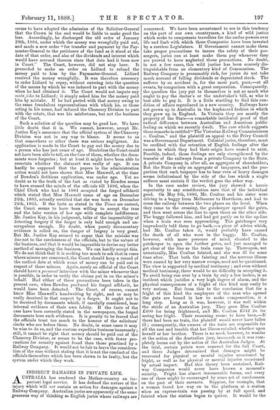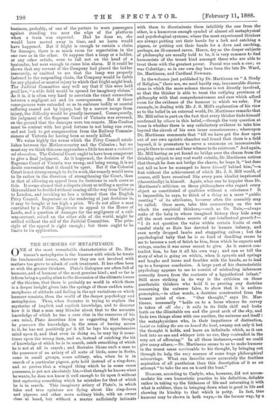INDIRECT DAMAGES IN PRIVATE LIFE.
AITSTRALIA has rendered the Mother-country an im- portant legal service. It has defined the nature of the injury which will not sustain an action for damages against a Railway Company. Australian juries are apparently of the same generous way of thinking as English juries where railways are
sengers, juries can at least make them pay whenever they are proved to have neglected these precautions. No doubt, in not a few cases, this wild justice has been scarcely dis- tinguishable from an elementary kind of Communism. The Railway Company is presumably rich, for juries do not take much account of falling dividends or depreciated stock. The sufferer by an accident is, for the most part, poor,—at all events, by comparison with a great corporation. Consequently, the question the jury put to themselves is not so much who ought to pay the doctor's or the undertaker's bill, as who is best able to pay it. It is a little startling to find this con- dition of affairs reproduced in a new country. Railways have not grown up in Australia in the haphazard fashion in which they grew up in England. In Victoria they are mostly the property of the State—a remarkable incidental proof of that radical difference between Australian and American public feeling on which we recently dwelt. The case which suggests these remarks is entitled" The Victorian Railway Commissioners v. Coultas," and the plaintiff on appeal to the Privy Council was a Government Department. Colonial juries, therefore, must be credited with the retention of English feelings after the causes in which they had their origin have ceased to exist. Possibly, indeed, those feelings are only strengthened by the transfer of the railways from a private Company to the State. A private Company is, after all, an aggregate of shareholdere. But the State is only an aggregate of taxpayers, and the pro- portion that each taxpayer has to bear even of heavy damages seems infinitesimal by the side of the loss which a single sufferer must sustain if the verdict goes the other way.
In the case under review, the jury showed a heroic superiority to any consideration save that of the individual good. On May 8th, 1886, Mr. Coultas and his sister were driving in a buggy from Melbourne to Hawthorn, and had to cross the railway between the two places on the level. When they came to the crossing, the gatekeeper opened the gates, and then went across the line to open those on the other side. The buggy followed him, and had got partly on to the up-line when a train was seen approaching. The gatekeeper very imprudently told them to go back,—a piece of advice which, had Mr. Coultas taken it, would probably have caused the death of all who were in the buggy. Mr. Coultas, however, with more presence of mind, shouted to the gatekeeper to open the further gates, and just managed to get clear of the line as the train came by. Thereupon, not unnaturally, Miss Coultas fainted, and she was ill for some time after. That both the fainting and the nervous illness were caused by her very narrow escape, need not be questioned. The view is supported by medical testimony ; and even without medical testimony, there would be no difficulty in accepting it. To avoid being run over by a train by only a few inches, is an incident which justifies a very high degree of alarm, and the physical consequences of a fright of this kind may easily be very serious. But from this to the conclusion that for a fright of this kind the employers of the man who opened the gate are bound in law to make compensation, is a long step. Long as it was, however, it was well within the stride of an Australian jury. They gave Miss Coultas £400 for being frightened, and Mr. Coultas £342 2s. for seeing her fright. Their reasoning seems to have been,—If there had been no train, the plaintiff would never have fallen ill ; consequently, the owners of the train are responsible for all the cost and trouble that her illness entailed, whether upon herself or her brother. There is no need, however, to wonder at the action of the Australian jury, inasmuch as it was com- pletely borne out by the action of the Australian Judges. At the trial, certain points were reserved for the full Court, and three Judges determined that damages might be recovered for physical or mental injuries occasioned by fright, as well as for physical or mental injuries occasioned by actual impact. Had this theory been sustained, Rail- way Companies would never have known a moment's security. Fright has almost innumerable forms, and every one of these might be encouraged by some act of carelessness on the part of their servants. Suppose, for example, that a woman found her way on to the platform at a station when an express-train was passing by at full speed, and fainted when the station began to quiver. It would be the business, probably, of one of the porters to warn passengers against standing too near the edge of the platform when a train was expected. Had he done so, she would have moved away in time, and no harm would have happened. But if fright is enough to sustain a claim for damages, there is as much room for expectation in the one case as in the other. Or suppose that a lamp or a ladder, or any other article, were to fall not on the head of a bystander, but near enough to cause him alarm. If it could be shown that any servant of the Company had placed the ladder insecurely, or omitted to see that the lamp was properly fastened to the suspending chain, the Company would be liable for any physical or mental injury to which that fright might lead. The Judicial Committee may well say that if this were held good law, " a wide field would be opened for imaginary claims." As it is, it is often very hard to ascertain the exact connection between a negligent act and its consequences. But if these consequences were extended so as to embrace bodily or mental suffering caused not by injury, but by a narrow escape from injury, the difficulty would be greatly increased. Consequently, the judgment of the Supreme Court of Victoria was reversed, on the ground that the damages were too remote. Miss Coultas must be content with her good fortune in not being run over, and not look to get compensation from the Railway Commis- sioners of Victoria for having been so nearly killed.
We value highly the nexus which the Privy Council estab- lishes between the Mother-country and the Colonies ; but we must say we think this case approaches a little too near a reductio ad absurdum. The Colonial Court ought to have been competent to give a final judgment. As it happened, the decision of the Supreme Court of Victoria was wrong, and being wrong, it is no doubt convenient that it should be upset. But if the Colonial Court is not strong enough to do its work, the remedy would seem to lie rather in the direction of strengthening the Court, than in that of allowing an appeal from its decisions in such cases as this. It seems absurd that a dispute about so trifling a matter as this could not be decided without coming all the way from Victoria to London, and invoking no less a tribunal than the English Privy Council. Important as the rendering of just decisions is, it may be bought at too high a price. We do not allow a man convicted by a Police Magistrate to appeal to the House of Lords, and a question of damages for the negligence of a rail- way-servant, raised on the other side of the world, might be settled without the aid of the Judicial Committee. The prin- ciple of the appeal is right enough ; but there ought to be limits to its application.



































 Previous page
Previous page